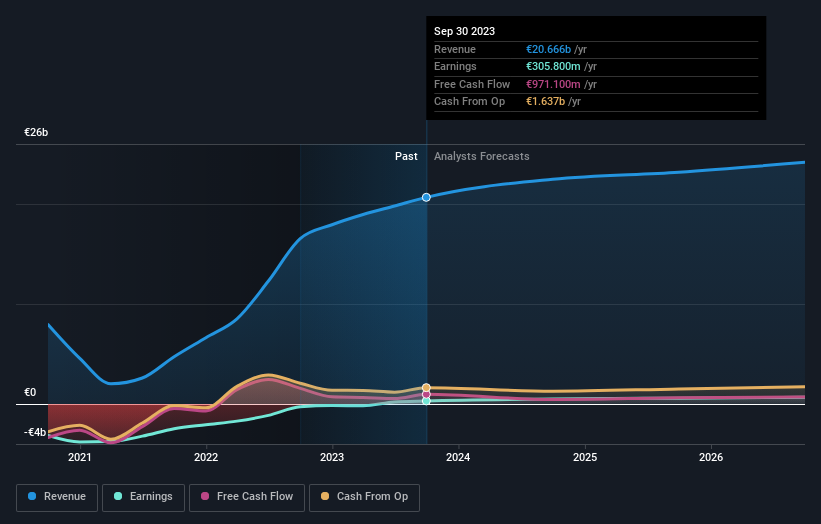TUI AG (ETR:TUI1) most popular amongst retail investors who own 43% of the shares, institutions hold 35%
Key Insights
The considerable ownership by retail investors in TUI indicates that they collectively have a greater say in management and business strategy
A total of 14 investors have a majority stake in the company with 50% ownership
Insiders own 11% of TUI
A look at the shareholders of TUI AG (ETR:TUI1) can tell us which group is most powerful. We can see that retail investors own the lion's share in the company with 43% ownership. Put another way, the group faces the maximum upside potential (or downside risk).
Meanwhile, institutions make up 35% of the company’s shareholders. Institutions often own shares in more established companies, while it's not unusual to see insiders own a fair bit of smaller companies.
In the chart below, we zoom in on the different ownership groups of TUI.
View our latest analysis for TUI

What Does The Institutional Ownership Tell Us About TUI?
Many institutions measure their performance against an index that approximates the local market. So they usually pay more attention to companies that are included in major indices.
As you can see, institutional investors have a fair amount of stake in TUI. This implies the analysts working for those institutions have looked at the stock and they like it. But just like anyone else, they could be wrong. If multiple institutions change their view on a stock at the same time, you could see the share price drop fast. It's therefore worth looking at TUI's earnings history below. Of course, the future is what really matters.

TUI is not owned by hedge funds. Looking at our data, we can see that the largest shareholder is Alexey Mordashov with 11% of shares outstanding. Meanwhile, the second and third largest shareholders, hold 9.6% and 4.7%, of the shares outstanding, respectively.
Looking at the shareholder registry, we can see that 50% of the ownership is controlled by the top 14 shareholders, meaning that no single shareholder has a majority interest in the ownership.
While studying institutional ownership for a company can add value to your research, it is also a good practice to research analyst recommendations to get a deeper understand of a stock's expected performance. There are a reasonable number of analysts covering the stock, so it might be useful to find out their aggregate view on the future.
Insider Ownership Of TUI
The definition of an insider can differ slightly between different countries, but members of the board of directors always count. The company management answer to the board and the latter should represent the interests of shareholders. Notably, sometimes top-level managers are on the board themselves.
Most consider insider ownership a positive because it can indicate the board is well aligned with other shareholders. However, on some occasions too much power is concentrated within this group.
It seems insiders own a significant proportion of TUI AG. It has a market capitalization of just €3.2b, and insiders have €357m worth of shares in their own names. That's quite significant. Most would say this shows a good degree of alignment with shareholders, especially in a company of this size. You can click here to see if those insiders have been buying or selling.
General Public Ownership
With a 43% ownership, the general public, mostly comprising of individual investors, have some degree of sway over TUI. While this size of ownership may not be enough to sway a policy decision in their favour, they can still make a collective impact on company policies.
Private Company Ownership
It seems that Private Companies own 11%, of the TUI stock. It's hard to draw any conclusions from this fact alone, so its worth looking into who owns those private companies. Sometimes insiders or other related parties have an interest in shares in a public company through a separate private company.
Next Steps:
It's always worth thinking about the different groups who own shares in a company. But to understand TUI better, we need to consider many other factors. Case in point: We've spotted 1 warning sign for TUI you should be aware of.
If you would prefer discover what analysts are predicting in terms of future growth, do not miss this free report on analyst forecasts.
NB: Figures in this article are calculated using data from the last twelve months, which refer to the 12-month period ending on the last date of the month the financial statement is dated. This may not be consistent with full year annual report figures.
Have feedback on this article? Concerned about the content? Get in touch with us directly. Alternatively, email editorial-team (at) simplywallst.com.
This article by Simply Wall St is general in nature. We provide commentary based on historical data and analyst forecasts only using an unbiased methodology and our articles are not intended to be financial advice. It does not constitute a recommendation to buy or sell any stock, and does not take account of your objectives, or your financial situation. We aim to bring you long-term focused analysis driven by fundamental data. Note that our analysis may not factor in the latest price-sensitive company announcements or qualitative material. Simply Wall St has no position in any stocks mentioned.
